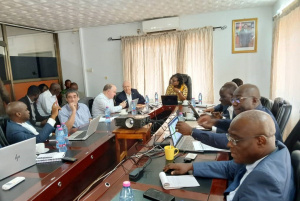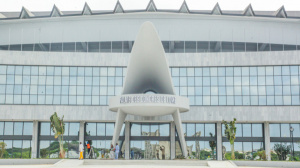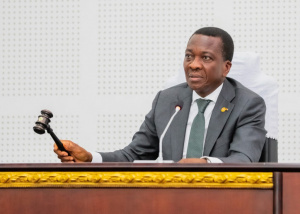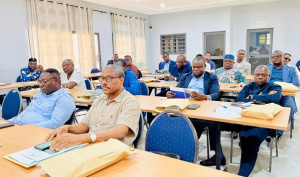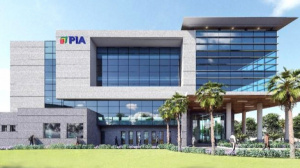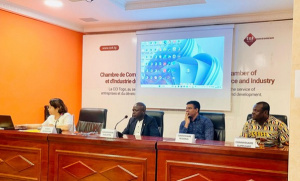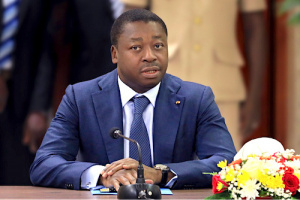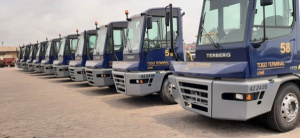Togo First
Togo Launches Next Phase of National Water Programme
Togo is gearing up for the second phase of its National Water Development Programme (PND Eau), a project backed by the European Investment Bank (EIB) and the French Development Agency (AFD). Last week, these institutions met with Togolese authorities to map out the investment strategy for this new phase. The first phase ended on December 31, 2025,
Its new phase will focus on urban centers in the Savanes region and semi-urban centers in the Kara and Plateaux regions. It will involve work in five urban centers in Savanes, including Dapaong, Cinkassé, Tandjouaré, Mandouri, and Gando, as well as seven semi-urban centers in Kara and Plateaux, including Korbongou, Gandi, Kabou, Soudou-Tchalimdè, Amou-Oblo, Glei, and Wahala.
During their mission, EIB representatives assessed the project's strategic directions and the progress of the first phase to adjust their financial support. Launched in June 2020, the first phase secured €40 million in financing (around CFA26 billion).
The coming phase covers 30 centers within the ToE's operating perimeter, including localities like Kpémé, Djagblé, Vogan, Tabligbo, Kévé, Élavagnon, Amou, Tohoun, Amlamé, Anié, Danyi, Atakpamé, Agou, Kpalimé, Adjengré, Sotouboua, Sokodé, Tchamba, Kara, Niamtougou, Kanté, Kabou, Kétao, Pagouda, Pya, Bassar, Bafilo, Kouka, Mango, Dapaong, and Tandjouaré.
The PND Eau aims to expand and modernize infrastructure for mobilizing, producing, and distributing drinking water in urban and semi-urban areas, ensuring a viable financial model for all parties. It also seeks to establish a contractual framework involving private partners in managing drinking water mini-networks, provide detailed studies and master plans for the country's main urban centers, and improve the operational performance of the ToE.
Esaïe Edoh
Ecobank Togo Unveils Enhanced Ellever Program for Women Entrepreneurs
On International Women's Rights Day, March 8, 2025, Ecobank Togo launched an upgraded version of its Ellever program, designed to boost financial inclusion and empower women-led businesses. The initiative targets female entrepreneurs, leaders, and salaried women, and focuses on young entrepreneurs and companies with major female ownership or leadership.
Togo's Minister of Trade, Rose Kayi Mivedor, praised the move, citing a World Bank study that shows women-run micro-businesses in Togo outperform those led by men. She highlighted government efforts like Projet d’Appui à l’Inclusion Financière des Femmes Vulnérables (PAIFFV) to enhance financial inclusion for vulnerable women.
Eusèbe Afoutou, Acting Managing Director of Ecobank Togo, emphasized that the program tackles key challenges such as access to finance and gender stereotypes. Ecobank has previously disbursed CFA2 billion to the Association des Revendeuses de Pagne du Togo, underscoring its commitment to supporting women entrepreneurs.
Ayi Renaud Dossavi
Togo Announces New Agricultural Modernization Program
Togo is rolling out a bold new agricultural modernization program–the ProMAT. The project aims to transform the local agricultural sector over the next decade (2025-2034).
Officials recently presented the ProMAT to key stakeholders and financial partners. It spells a clear plan to boost agriculture's economic impact, create jobs, and promote social inclusion.
The ProMAT tackles two major challenges head-on: climate change and making local products more competitive. Agriculture is a pillar of the Togolese economy and vital for food security.
The new program focuses on four key areas. First, it will support farmers in producing more and withstanding harsh weather conditions. Next, it will also help them sell at better prices and access markets more easily. Additionally, the ProMAT will make it easier for farmers to get financing and encourage private investment. Finally, it aims to bolster governance to ensure policies work effectively and everyone involved works together smoothly.
The ProMAT builds on previous initiatives like the National Investment and Food Security Programme (PNIASA) and the National Agricultural Investment, Food Security and Nutrition Programme (PNIASAN).
Esaïe Edoh
Togo Completes Senate with 61 Members
Togo's Senate, the second chamber of parliament, is now fully operational with 61 members. The President of the Republic appointed 20 senators, while 41 were elected through senatorial elections.
In the senatorial elections, the UNIR party emerged victorious with 34 senators, followed by the BATIR party with 2 senators. The UFC, CLE, LTA, and ADDI parties each secured one seat, along with one independent. The UNIR party dominates the Togolese Senate, holding more than 80% of the seats, according to the official results from the Independent National Electoral Commission (CENI).
Full List of the Senate
Elected Representatives
- Agoè-Nyivé: KPODO Adjowa (UNIR) and BANYBAH Afiwavi Enyonam Vicenzia (BATIR) were elected.
- Avé: ATSOU Ayawo (BATIR) won a seat.
- Bas-Mono: AFANGBEDJI Komlanvi Sédoufia (UFC) was elected.
- Gulf: OLYMPIO Adeblewo Kossi (Independent "Les Deux Bisons") and KOSSI Agbeboume (CLE) secured seats.
- Lakes: AQUEREBURU Alexis John Koffi Darwin (UNIR) was elected.
- Vo: ALOGNON Anani Akoete (UNIR) won a seat.
- Yoto: AGBABLI Koffi (LTA) was elected.
- Zio: GOMADO Kwami (UNIR) secured a seat.
- Agou: PANIAH Kofi Agbenoxevi (UNIR) was elected.
- Akebou: BLAMCK Koffi Leeye (UNIR) won a seat.
- Amou: MALLY Komlan (UNIR) was elected.
- Anié: OGOUHOUNDE Kokou (UNIR) secured a seat.
- Danyi: AGBEFLE Koffi Ganyo (ADDI) was elected.
- Est-Mono: AGO BAZAA Bawbady (UNIR) won a seat.
- Haho: ADADJI Koffi Efanam (UNIR) was elected.
- Kloto: ATUTONU Amah (UNIR) secured a seat.
- Kpélé: APETSIANYI Agbobli Eli Déla (UNIR) was elected.
- Moyen-Mono: SOSSOU Viwoto Sewonou Yaovi (UNIR) won a seat.
- Ogou: OTIMI Kossiwa Nemonha (UNIR) was elected.
- Wawa: SESSENOU Kwadjo Fiatuwo (UNIR) secured a seat.
- Blitta: GNAHOUAME Atchou (UNIR) was elected.
- Mo: MAGNETINE Assindah (UNIR) won a seat.
- Sotouboua: AMELETE Bawoumondom (UNIR) was elected.
- Tchamba: DRAMANI Dama (UNIR) secured a seat.
- Tchaoudjo: CISSE Alilou Sam-Dja (UNIR) was elected.
- Assoli: BAH-TRAORE Baba Dogo (UNIR) won a seat.
- Bassar: DJATO Tassounti (UNIR) was elected.
- Binah: DIOGO Koudjolou (UNIR) secured a seat.
- Dankpèn: YAGNINIM Bitokotipou (UNIR) was elected.
- Doufelgou: AYASSOR Adji Oteth (UNIR) won a seat.
- Kéran: NASSOU Alouadjou Katou (UNIR) was elected.
- Kozah: WALLA EDJAIDE Pehena Paganao (UNIR) secured a seat.
- Cinkassé: KANKPE-KOMBATH Gnitiguine Boule (UNIR) was elected.
- Kpendjal: SAMBIANI Yentema Augustin (UNIR) won a seat.
- Kpendjal West: BOLALE Gnoate (UNIR) was elected.
- Oti: DE POUKN Mantode (UNIR) secured a seat.
- Oti Sud: LAMBONI Mindi (UNIR) was elected.
- Tandjouaré: BARNABO Nampoukime (UNIR) won a seat.
- Tone: BARQUE Barry Moussa (UNIR) was elected.
Senators Appointed
The President of the Republic appointed the following senators:
- ABOUGNIMA K. Molgah
- AKOUETE Yaovi Beliki
- ALIPUI Sénanu Koku
- AZIABLE Koami N'kunu
- BALOUKI-LEGUEZIM Bernadette
- BATIKRANA Kpenta wife BALAKA
- BOURAÏMA Inoussa
- DANGBUIE Afi Xolali Pascaline
- DJIDONOU Akpénè
- JOHNSON Togbé Ampah
- KABOUA Essokoyo Abass
- KAGBARA Uleija Y. M. Innocent
- KOFFIGOH Kokou Joseph
- KOLANI Lardja
- KOUVAHEY Amoko Holadem
- KPEGBA Kafui
- LAMBONI-KABISSA Issoyotou
- SANKAREDJA Moni wife SINANDJA
- SANT'ANNA Edwige Clara Ayawovi widow AYAYI-ATAYI
- TCHASSONA Traoré Mouhamed
Ayi Renaud Dossavi
Togo Scores CFA129 Billion Budget Surplus amid COVID-19
On March 7, 2025, Togo's National Assembly approved the budget settlement laws for the 2020 and 2021 financial years. This move is crucial for ensuring transparency and good governance in public finances. It also provides an opportunity to review the implementation of the budget during these two years.
The parliamentary notes reveal that in 2020, the Treasury collected CFA1,612.6 billion. That was 96.2% of the sum expected that year–CFA1,676.8 billion. Meanwhile, committed expenditure was CFA1,509.9 billion, resulting in a surplus of CFA102.8 billion for that year. This surplus was largely due to actual spending being lower than projected.
In 2021, revenue increased to CFA1,641.2 billion, with a budget implementation rate of 96.4%. Expenses totaled CFA1,613.9 billion, against CFA1,702.9 billion anticipated, reflecting a surplus of CFA27.3 billion.
Over these two years, Togo recorded a consolidated surplus of CFA129 billion. According to Pacôme Adjourouvi, Minister for Human Rights and Citizenship Training, these results reflect rigorous public finance management and the government's commitment to enhancing budget transparency.
These years coincided with the peak of the COVID-19 pandemic, marked by economic contraction and major budgetary efforts to address the pandemic's economic and social impacts both nationally and internationally.
Ayi Renaud Dossavi
The CCI-Togo Kicks Off Decentralization Process in Kpalimé
The Togolese Chamber of Commerce and Industry (CCI-Togo) is setting up its regional offices across the country. This decentralization push started on March 6 in Kpalimé, in the prefecture of Kloto, where the first branch officially opened its doors.
The move aims to bring the CCI-Togo closer to local businesses and governments.
These new offices will act as liaisons, making it easier for economic players to connect with public authorities. Following Kpalimé, more offices will open in other regions, amplifying the CCI-Togo's voice locally.
These regional offices have a clear mission: oversee and coordinate local initiatives that align with the Chamber's goals. They will ensure that national strategies are implemented while adapting to each region's unique economic landscape.
The new offices will promote awareness and encourage businesses to join the CCI-Togo. José Symenouh, the institution's chairman, believes this approach will forge stronger ties between entrepreneurs and local authorities, leading to more unified action and development.
Each new office will create a tailored action plan to boost the CCI-Togo's presence and grow its membership.
Esaïe Edoh
Togo: Economy Expands in January, Business Confidence Remains High (BCEAO)
The Togolese economy is off to a good start in 2025. The latest statistics show that industrial production is strong, services and trade are growing, and inflation is controlled. However, economic policies might need some adjustments in the coming months.
Industrial Efficiency in Motion
Togo's industrial sector is performing well. In January 2025, industrial production increased by 10.5%, following an 11.0% rise in December 2024. The slight difference does not reflect a slower growth, but rather that it needs to be sustained. The Industrial Platform of Adetidokpé or Plateforme Industrielle d’Adétidokpé (PIA) could further boost industrial activity by attracting new investments and enhancing local industrialization, especially in processing agricultural raw materials.
In market services, sales rose 3.4% in January, less than the previous month's 5.0% but still positive. Trade also increased by 1.2%, following a 4.8% rise in December. This could be a post-holiday adjustment or a signal to watch.
Inflation and Business Confidence
Inflation is stable, with an annual rate of 2.5%, within the BCEAO's target range of 1% to 3%. This follows a broader trend of price stabilization after previous surges. Inflation decreased from 7.6% in 2022 to 3.3% in 2024 and is projected to reach 2.3% in 2025. The decline in imported food prices, such as rice (-13.8%) and sugar (-14.1%), contributed to this balance. However, prices of oil (+43.3%) and milk (+26.8%) keep rising, which could impact purchasing power.
With an index of 100.7, the business climate remains stable, thus economic players are neither overly optimistic nor worried. Business leaders remain confident, reflecting a favorable economic environment where the private sector continues to invest and hire despite economic challenges.
A Promising Economic Outlook
The International Monetary Fund (IMF) forecasts a 5.3% economic growth for 2025, slightly lower than the 5.6% in 2023 but still solid. This growth should be supported by public infrastructure investments, a thriving industrial sector, and tighter fiscal policies. However, prudent economic management is necessary to balance growth, inflation control, and public debt management.
Fiacre E. Kakpo
Togolese Business Leaders Set to Explore Opportunities in China
Nearly 100 Togolese business leaders will travel to China from March 13 to 24 on a trade mission aimed at strengthening economic ties and exploring new opportunities. The initiative is led by the Togo Chamber of Commerce and Industry (CCI-Togo) in partnership with the Hebei Enterprise Culture Association.
The delegation will focus on key industries such as construction, mechanical engineering, civil engineering, agriculture, livestock, automotive, and packaging. As part of the trip, participants will visit factories specializing in ceramic tiles, electrical cables, pipes, agricultural machinery, and auto parts.
Bekley Esso-Byou, CCI-Togo’s commissioner for the industrial sector, called the mission a major step for Togolese businesses looking to forge partnerships with Chinese companies. He emphasized CCI-Togo’s ongoing efforts to support local entrepreneurs in expanding internationally, noting that such trade missions help improve their competitiveness.
The visit is part of a broader collaboration under a memorandum of understanding between CCI-Togo and the Hebei Enterprise Culture Association, aimed at deepening economic cooperation between Togo and China.
Faure Gnassingbé Finalizes Togo’s Senate with 20 Appointments
Togolese President Faure Gnassingbé has appointed 20 senators, completing the Senate's composition as the second chamber of parliament. The announcement, made by presidential decree on March 5, 2025, follows recent senatorial elections dominated by the ruling Union for the Republic (UNIR) party, which secured 34 of the 41 available seats.
This development marks a step toward Togo’s Fifth Republic and a transition to a parliamentary system, granting more powers to the legislature.
The 20 appointed senators include political figures from various parties, former MPs, and senior civil servants. The full list is as follows:
- Mrs. ABOUGNIMA K. Molgah
- Mr. AKOUETE Yaovi Beliki
- Mr. ALIPUI Sénanu Koku
- Mr. AZIABLE Koami N'kunu
- Mrs. BALOUKI-LEGUEZIM Bernadette
- Mrs. BATIKRANA Kpenta wife of BALAKA
- Mr. BOURAÏMA Inoussa
- Mrs. DANGBUIE Afi Xolali Pascaline
- Mrs. DJIDONOU Akpénè
- Mr. JOHNSON Togbé Ampah
- Mr. KABOUA Essokoyo Abass
- Mr. KAGBARA Uleija Y. M. Innocent
- Mr. KOFFIGOH Kokou Joseph
- Mr. KOLANI Lardja
- Mrs. KOUVAHEY Amoko Holadem
- Mrs. KPEGBA Kafui
- Mrs. LAMBONI-KABISSA Issoyotou
- Mrs. SANKAREDJA Moni, wife of SINANDJA
- Mrs. SANT’ANNA Edwige Clara Ayawovi widow of AYAYI-ATAYI
- Mr. TCHASSONA Traoré Mouhamed
The next steps include the senators assuming their roles, electing the Senate President, and selecting the President of the Council of Ministers and the President of the Republic.
Ayi Renaud Dossavi
AGL-Togo Expands Fleet with New Terberg Tractors
The Togolese branch of Africa Global Logistics (AGL), formerly Bolloré Transport & Logistics, has added 10 new Terberg tractors to its fleet. The vehicles came in this week.
The new tractors are designed to handle trailers and containers efficiently over short distances. They will help streamline transport operations, reduce delays, and improve efficiency compared to traditional trucks. These vehicles will operate at the Lomé terminal, optimizing the flow of goods and increasing the port's productivity.
AGL highlighted on social media that the new rolling stock, a valuable asset, will improve coordination between the port and industrial sectors.
Their acquisition reflects AGL’s focus on innovation and modernization. The company aims to make the Port of Lomé more competitive, in line with Togo’s ambition to become a leading logistics hub in West Africa.
Esaïe Edoh

